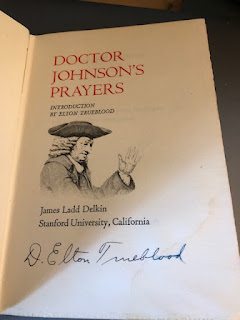Steve Allen would invite three audience members to the stage and ask each to strike a single key on his piano keyboard. He would take the three notes and improvise a melody, complete with harmonies and rhythm. It was impressive to us non-musicians and mundane to experienced jazz musicians, for whom improvisation is part of the job description. In a related bit, Allen would take photographs of power lines on which birds were perched, treat the birds and lines as notes on a musical staff and, once again, improvise. What John Cage pretentiously dubbed “aleatoric music” – relying on chance as an element in musical composition -- Allen treated as a parlor game.
A reader has
alerted me to someone on Twitter posing a similar stunt: “Pick any bookcase in
your house. Bottom shelf. Eighth book from the left. What is it?” I draw no grand
conclusions from the results. My motive is idle curiosity.
In another bookcase in my office, the eighth book from the left on the bottom shelf is a paperback copy of Henry James’ Daisy Miller. On others: Henry Roth’s Call It Sleep (1934), Ernest B. Furgurson’s Chancellorsville 1863 (1992), Whitney Balliett’s New York Voices: Fourteen Portraits (2006), The Poems of Basil Bunting (2016).

Bonus fact: Richmond, Indiana is also the hometown of the (now retired) American composer Ned Rorem who, if he makes it to October 23, will be 99 years old this year.
ReplyDeleteRandom shelf, eight books in: "Memoirs of Prince von Bulow: Volume 2: From the Morocco Crisis to Resignation, 1903-1909," translated from the German by Geoffrey Dunlop (1931).
Bookcase to my left: All my own manuscripts [because the binders are too long for a 1' high shelf]
ReplyDeleteBookcase to my right: THE IMAGE OF WAR, 1861-1865, Vol. 2
Andrew Reinbach
Strong's Bible Concordance. Strong's, Young's, and Cruden's were probably the three concordances most commonly encountered in relatively recent but pre-personal computer days. The saying was: Young's for the young, Strong's for the strong, and...
ReplyDeleteMy first full concordance was a Cruden's, which was quite serviceable. Cruden seems to have been a man of astonishing application, and an eccentric.
Old Peter's Russian Tales by Arthur Ransome. First published 1916, my copy is a nice Jonathan Cape edition from 1985.
ReplyDelete